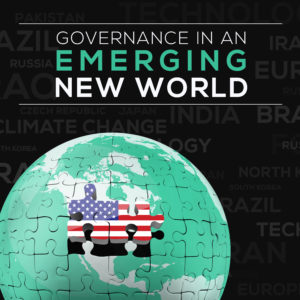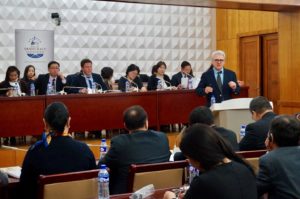
NDI
In recent years, an array of challenges have threatened democracies. Resurgent authoritarianism, cultures of corruption, violent extremism, disinformation, rising inequality and more dominate the headlines. Scholars have warned of a global democratic recession. Translating democracy’s promise into a better life for all can be frustratingly slow and difficult, but we have found over the past 35 years that, whatever its shortfalls, democracy works. It is the only form of government that allows for peaceful self-correction.
DemWorks, the podcast, will examine democracy’s challenges and opportunities with the help of National Democratic Institute President Derek Mitchell and Democracy Heroes around the world who are working for democracy and making democracy work. Starting with former Secretary of State Madeleine K. Albright (above).
Democratic distemper?
 To some extent, as in the 1970s, today’s crisis of democracy reflects too much democracy, argues Morris P. Fiorina, the Wendt Family Professor of Political Science at Stanford University. The policy processes have been stripped of any insulation they once had. Every voice, no matter how few express it or how extreme the expression, has the opportunity to make itself heard. And because politics is so open to popular participation, today’s parties and politicos are hyper-responsive to the voices loosely associated with “their side,” he writes for the Hoover Institution’s Governance in an Emerging New World series.
To some extent, as in the 1970s, today’s crisis of democracy reflects too much democracy, argues Morris P. Fiorina, the Wendt Family Professor of Political Science at Stanford University. The policy processes have been stripped of any insulation they once had. Every voice, no matter how few express it or how extreme the expression, has the opportunity to make itself heard. And because politics is so open to popular participation, today’s parties and politicos are hyper-responsive to the voices loosely associated with “their side,” he writes for the Hoover Institution’s Governance in an Emerging New World series.

IRI
For a legislature, one of the most vital functions is found in the committee hearing room, say Burt-Ujin Bayarsaikhan, the International Republican Institute’s Maggie Stewart,
Public hearings provide citizens an opportunity to speak directly to policymakers about matters that are important to them. They offer legislators key insights as to what is on the minds of their constituents, providing valuable, fact based legislative analysis. Public hearings also help provide greater transparency and oversight. They serve as a mechanism that members of parliament can use to gather popular opinions and make better-informed decisions and policy. Without public hearings, a legislature cannot be the true voice and representation of the people.
Enter Mongolia. A former-Soviet Union communist ally, Mongolia just entered its fledgling democratic era in 1990. Its democratic principles are constantly challenged due to its hostile, undemocratic neighbors; Russia to the north and China to the South. The State Great Hural (SGH) has never held a public hearing. Until now….RTWT







